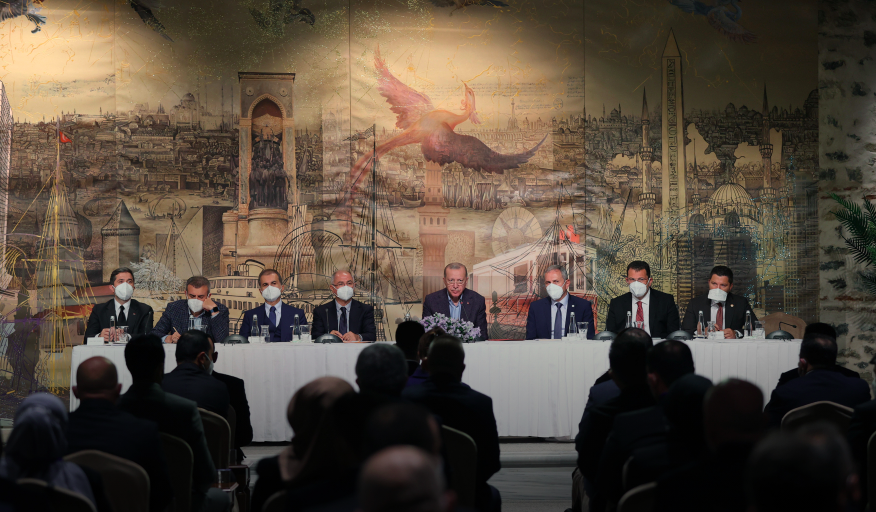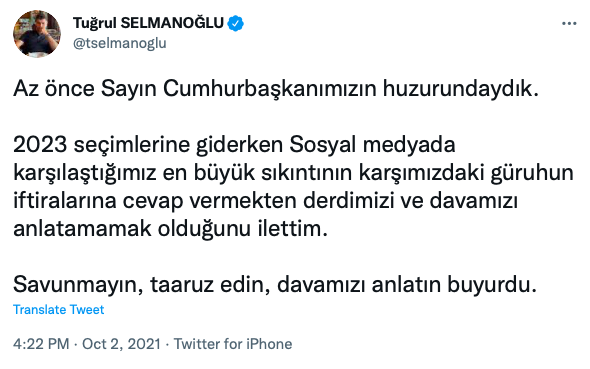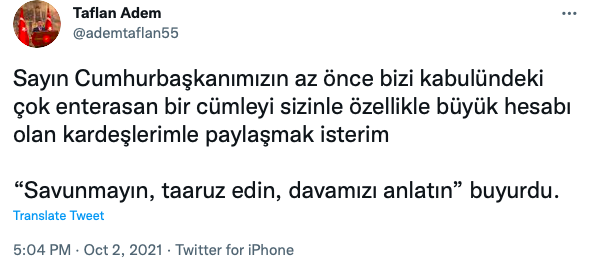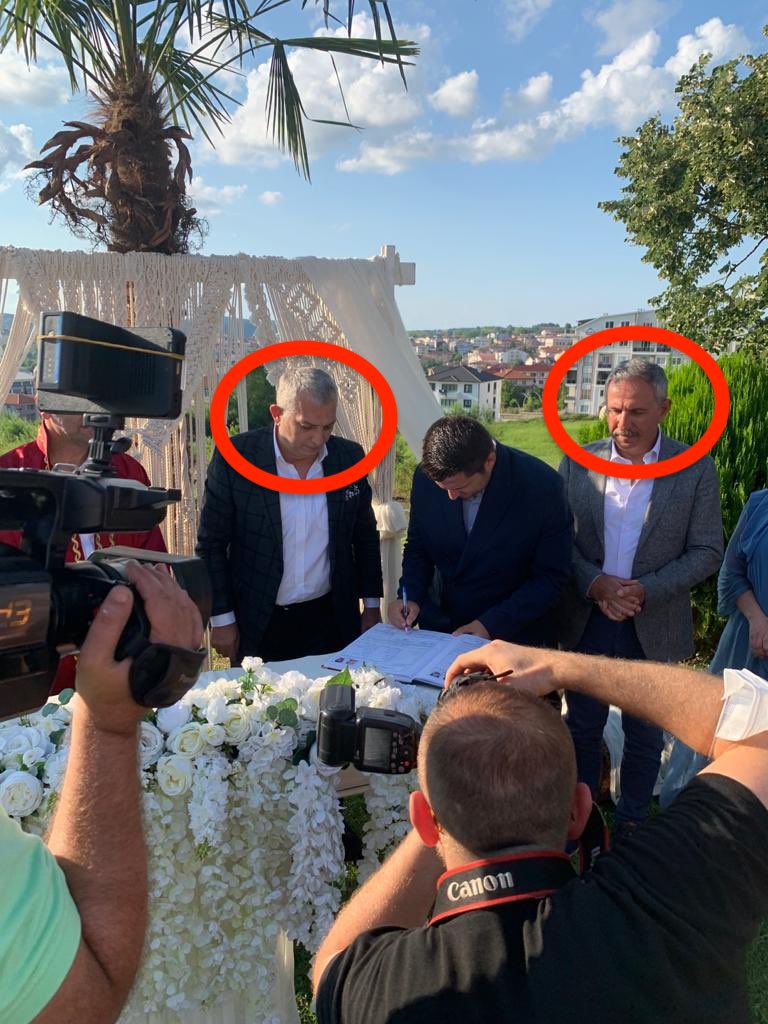Levent Kenez/Stockholm
Turkish President Recep Tayyip Erdoğan last week hosted a delegation from the Union of International Democrats (UID), his ruling party’s organization in Europe, at Dolmabahçe Palace in İstanbul. He spoke out against Islamophobia and racism in front of the cameras; however, he instructed his party members to be more aggressive and active during the closed-door part of the meeting, Nordic Monitor has learned.
Erdoğan, who has been unable to make speeches as long as before due to health problems, devoted his opening address, which lasted some three-and-a-half minutes and was read from a teleprompter, to threats of Islamophobia, xenophobia and cultural racism. He urged the UID members to raise these issues in public as a basis for cooperating with other Muslim and migrant communities. Erdoğan also claimed that xenophobia and animosity towards Islam would become more widespread in Europe as economic hardship increases in the post-pandemic era. He said he wanted to listen to members of the delegation rather than talk, so the closed part of the meeting began.

The UID delegates, who consisted of 41 regional chiefs from 26 European countries as well as party members, talked about the legal and social problems they experienced with the authorities in the countries they live in and said they wanted Turkish state institutions to provide them more assistance. The delegates also complained that opponents of the Erdoğan regime living in Europe were more successful in influencing public opinion and that they were deliberately favored by the “anti-Turkey European countries,” stating that they were subjected to double standards because they supported Erdoğan. Erdoğan repeated his promise of the full support of Turkish government agencies.
Asked by a notorious Twitter troll, Selman Kuzuoğlu, who lives in Germany, about “the fact that Erdoğan supporters could not find the opportunity to explain their case because of responding to the slander of the opponent mob on social media,” Erdoğan told the UID delegates, “Don’t defend, attack, explain our cause!” He interestingly preferred a military term — “Taarruz etmek” in Turkish — showing that Erdoğan views the political struggle as a war.


Erdoğan had previously announced that a media bill which would impose new restrictions would enter into force in the coming weeks. According to news in the Turkish media, the new bill calls for five years in prison for spreading online disinformation or misinformation. The bill is also intended to set up a directorate to monitor critical content. It is no secret that the Erdoğan government, which controls all Turkish media, is unhappy with critical content, especially that published abroad, on social media and plans to build a legal mechanism that censors critical posts and videos before the elections in 2023.
Erdoğan, who met with the UID representatives four times this year, in Brussels and Sarajevo and twice in Istanbul, attaches great importance to the Turkish diaspora loyal to him in Europe. The UID (formerly the UETD) is often described as the long arm of President Erdoğan in Europe for mobilizing the Turkish and Muslim diasporas for the goals of political Islamists back in Turkey. Erdoğan previously urged his supporters to secure important positions in the governments of their host countries.
Turkish government agencies, particularly the Turkish Development and Cooperation Agency (TİKA) and the Presidency for Turks Abroad and Related Communities (YTB) are mobilizing their resources to support the UID. In addition religious associations funded by Turkey including the Turkey Youth Foundation (TÜGVA), which belongs to the Erdoğan family, have close relations with the UID.

Nordic Monitor previously reported that Turkish intelligence agency MİT recruited spies from diaspora communities in Europe by using nongovernmental organizations, not surprisingly TİKA and the YTB.
The UID was originally founded in Cologne in 2004 as the Union of Turkish Democrats of the European Union (UETD) and changed its name to UID in order to improve its image, which had deteriorated dramatically due to incidents of violence its members were involved in, at a convention in Sarajevo attended by President Erdoğan as keynote speaker in 2018, reflecting the ambitions of the group to expand its operations beyond Europe. It currently has 152 offices in 17 countries: Austria, Belgium, Bosnia and Herzegovina, Czechia, Denmark, Finland, France, Germany, Hungary, Italy, Luxembourg, the Netherlands, North Macedonia, Norway, Sweden, Switzerland and the United Kingdom.
Köksal Kuş, a German citizen of Turkish origin, has been chairman of the UID since February. Unlike previous presidents, Kuş, who does not come from an Islamist background, was a member of the controversial youth organization of the Erdoğan government’s biggest supporter, the Nationalist Movement Party (MHP). Last May the European Parliament (EP) voiced concerns about the group, saying it was expanding to worrying levels not only in Turkey but also in EU countries, in its 2019-2020 report prepared by Turkey rapporteur Nacho Sanchez Amor. Underlining that the group is linked to the far-right MHP, the EP also called on EU countries to ban associations affiliated with them and closely monitor their activities since they pose a threat mainly to Kurds, Armenians and people of Greek origin, according to the report.

In 2017 an investigative report by German police linked Ankara to a boxing gang in Germany accused of going after opponents of the Turkish government. According to the investigation former lawmaker and Erdoğan’s longstanding friend Metin Külünk provided money to a boxing gang, Osmanen Germania, in Germany to buy weapons, organize protests and go after critics of the Erdoğan government, German media reported. Police investigations also suggested Osmanen Germania had contact with the UID.












